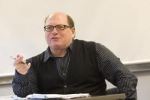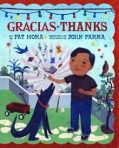 Margarita Engle has tapped into her Cuban-American heritage to create award-winning children’s books about the history of the island.
Margarita Engle has tapped into her Cuban-American heritage to create award-winning children’s books about the history of the island.
Her latest book, The Lightning Dreamer, Cuba’s Greatest Abolitionist, is out March 19. The story depicts the life of poet and abolitionist Gertrudis Gómez de Avellaneda in free verse.
In 2009, Engle was the first Latino/a to win the Newbery Honor Award for The Surrender Tree, about a nurse who helps those while war rages in Cuba in 1896. That book also won the Pura Belpré Prize, which honors children’s books that depict the Latino experience.
She also won the Pura Belpré Prize in 2008 for The Poet Slave of Cuba: A Biography of Juan Francisco Manzano.
She also has won three Américas Awards (for the 2012 Hurricane Dancers, The Surrender Tree and The Poet Slave of Cuba) and the Jane Addams Children’s Book Award (for The Surrender Tree).
Summer Birds: The Butterflies of Maria Merian was selected as a Kirkus Best Children’s Book.
Her other novels include The Firefly Letters, Tropical Secrets and The Wild Book.
The California-based Engle also has written two books – When You Wander and Mountain Dog – inspired by her work with search and rescue dogs.
 Q: Tell me about your book, The Lightning Dreamer. What inspired you to write about Gertrudis Gómez de Avellaneda?
Q: Tell me about your book, The Lightning Dreamer. What inspired you to write about Gertrudis Gómez de Avellaneda?
A: My interest in Avellaneda is two-fold. First, as one of Latin America’s earliest and boldest abolitionist writers, she was far ahead of her time. Her interracial romance novel, Sab, was published eleven years before Uncle Tom’s Cabin. Not only did Sab make an impassioned appeal for emancipation, it surpassed that narrow goal by showing the need for complete equality, with interracial marriage portrayed as a normal aspect of Cuba’s culturally mixed society. In addition, Avellaneda was one of the most celebrated feminist writers of the nineteenth century. Her poetry, prose, and plays were devoted to a lifelong struggle against the archaic custom of arranged marriage, which she regarded as the marketing of teenage girls. In fact, Sab is thought to be inspired by real people Avellaneda met at the age of 15, when she was sent away to a country estate “to rest,” after rejecting an arranged marriage that would have been profitable for her family.
 Like so many other early abolitionists and feminists, Avellaneda (right) has been forgotten by history. She is no longer well known outside of her native country of Cuba, and Spain, where she lived much of her adult life. I wanted to help bring her back from obscurity. In particular, I felt excited about depicting her life in accessible free verse, hoping that young readers might be inspired by her independent way of thinking. She believed in the Golden Rule. She used stories and poetry as a way to make an emotional plea for complete equality, and completely voluntary marriage. She was brave enough to do this a time when most writers restricted interracial love stories to lurid tales of wealthy men with forbidden mistresses.
Like so many other early abolitionists and feminists, Avellaneda (right) has been forgotten by history. She is no longer well known outside of her native country of Cuba, and Spain, where she lived much of her adult life. I wanted to help bring her back from obscurity. In particular, I felt excited about depicting her life in accessible free verse, hoping that young readers might be inspired by her independent way of thinking. She believed in the Golden Rule. She used stories and poetry as a way to make an emotional plea for complete equality, and completely voluntary marriage. She was brave enough to do this a time when most writers restricted interracial love stories to lurid tales of wealthy men with forbidden mistresses.
Personally, for me, the most impressive aspect of Avellaneda’s life is the way she overcame obstacles while she was still very young. Her mother regarded reading and writing as inappropriate for girls, so she had to write in secret, then burn her stories and poems.
Q: Many of your children’s books are about Cuban history. Why did you choose that particular subject to write about? How do you research the subjects?
A: My mother is Cuban and my father is American. I was born and raised in Los Angeles, but during long childhood visits to the island, I developed a deep bond with the extended family, and with tropical nature, as well as an interest in Cuba’s complex history. I loved listening to stories my grandmother and great-grandmother told about their own childhoods. Listening made me wonder, and wondering makes me want to write. The research process is slow and painstaking. I read everything I can find about a subject, both in English and Spanish. I utilize bibliographies, working my way farther and farther back in time, hoping to discover diaries or other first person accounts. Since many of those primary sources are not yet digitized, I rely on interlibrary loan as a way of obtaining antique volumes. Once the research is complete, I begin selecting those aspects that seem most important to me. Since most of my books are novels in free verse, I have to omit many facts and figures. All the names and dates of history won’t fit into a poem. My goal is to offer young readers a friendly, welcoming page filled with thoughts and feelings that have some universal resonance, in any time, and every place.
Q: What made you want to become a writer? Were there any Latino writers who influenced you?
A: As a child, I was such an avid reader that writing just seemed natural. While I was very young, I wrote poetry, and even when I drew a picture, there were always a few mysterious words scribbled in crayon, like the start of a story.
When I was little, my mother recited José Martí’s Versos Sencillos, and later, on my own, I discovered that I loved reading poets as diverse as Rubén Darío, Antonio Machado and Jorge Luis Borges. I found it strange that so few women were represented in Latino literature. Emily Dickinson had to fill the gap where Latina poets were missing from library shelves in the U.S. Eventually, I discovered Gabriela Mistral, and Dulce María Loynáz.
As a graduate student at U.C. Riverside, I had the privilege of taking a creative writing seminar from Tomás Rivera. He was a great Mexican-American poet and novelist, the first Latino Chancellor of a U.C. campus, and a wonderful educator. He taught me to write from the heart, without worrying about publication. So that’s what I do. I choose subjects that inspire me, instead of ones that are popular. He also taught me that writing takes practice, so that’s what I continue to do. I write at my own speed, as if time does not exist.
 • Nicolás Guillén (1902-1989), once the national poet of Cuba, is known for his poems about social justice that he wrote in the 1920s and 1930s. The country’s winners of the Miguel de Cervantes Prize, given to Spanish-language writers, are playwright Alejo Carpentier, poet Dulce María Loynaz and novelist Guillermo Cabrera Infante.
• Nicolás Guillén (1902-1989), once the national poet of Cuba, is known for his poems about social justice that he wrote in the 1920s and 1930s. The country’s winners of the Miguel de Cervantes Prize, given to Spanish-language writers, are playwright Alejo Carpentier, poet Dulce María Loynaz and novelist Guillermo Cabrera Infante. • Oscar Hijuelos, who was born in New York City to Cuban parents, became the first Latino to win the Pulitzer Prize for fiction with his 1989 book The Mambo Kings Play Songs of Love, about two Cuban brothers who pursue their musical dreams in New York City. Hijuelos also wrote the novels Our House in the Last World and Mr. Ives’ Christmas and the memoir Thoughts Without Cigarettes.
• Oscar Hijuelos, who was born in New York City to Cuban parents, became the first Latino to win the Pulitzer Prize for fiction with his 1989 book The Mambo Kings Play Songs of Love, about two Cuban brothers who pursue their musical dreams in New York City. Hijuelos also wrote the novels Our House in the Last World and Mr. Ives’ Christmas and the memoir Thoughts Without Cigarettes. • Two writers who were born in Havana and immigrated to the United States have used Cuba as a setting for their novels. Cristina García, left, showed one family’s life in Dreaming in Cuban and describes the effects of dictator Fidel Castro’s regime in the just released King of Cuba. The Castro government plays a key role in the characters’ lives of Elizabeth Huergo’s The Death of Fidel Pérez.
• Two writers who were born in Havana and immigrated to the United States have used Cuba as a setting for their novels. Cristina García, left, showed one family’s life in Dreaming in Cuban and describes the effects of dictator Fidel Castro’s regime in the just released King of Cuba. The Castro government plays a key role in the characters’ lives of Elizabeth Huergo’s The Death of Fidel Pérez. • California-raised children’s writer Margarita Engle draws on Cuba’s history for her free verse books, including The Lightning Dreamer, Cuba’s Greatest Abolitionist, about Gertrudis Gómez de Avellaneda; The Surrender Tree, about a nurse who helps those while war rages in Cuba in 1896; and The Poet Slave of Cuba: A Biography of Juan Francisco Manzano.
• California-raised children’s writer Margarita Engle draws on Cuba’s history for her free verse books, including The Lightning Dreamer, Cuba’s Greatest Abolitionist, about Gertrudis Gómez de Avellaneda; The Surrender Tree, about a nurse who helps those while war rages in Cuba in 1896; and The Poet Slave of Cuba: A Biography of Juan Francisco Manzano.  • Carlos Eire was airlifted from Havana during Operation Pedro Pan, a CIA operation in which thousands of Cuban children were taken to the United States in the early 1960s – an experience he wrote about in Waiting for Snow in Havana: Confessions of a Cuban Boy. His follow-up book was Learning to Die in Miami: Confessions of a Refugee Boy.
• Carlos Eire was airlifted from Havana during Operation Pedro Pan, a CIA operation in which thousands of Cuban children were taken to the United States in the early 1960s – an experience he wrote about in Waiting for Snow in Havana: Confessions of a Cuban Boy. His follow-up book was Learning to Die in Miami: Confessions of a Refugee Boy.















